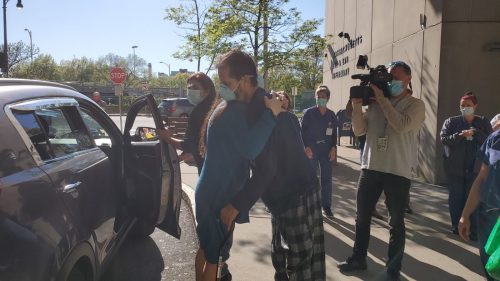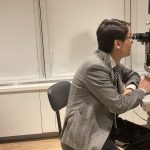In April, Mass. Eye and Ear transformed the 10th floor inpatient unit into an acute medical unit to care for COVID-19-positive patients who were transferred from the ICU at Massachusetts General Hospital. Although stable, these patients were acutely ill and required vital care with daily physician intervention, and were typically symptomatic from a cardiac standpoint. This area of the hospital quickly became a concentrated, intimate unit which provided highly specialized and personalized care.
In late March, 57-year-old father and grandfather Heladio Salgado tested positive for COVID-19. Heladio was put on a ventilator, and then received a tracheostomy tube, for 30 days at Mass General. During that time, he was in a medically induced coma, but his family never gave up hope. After his long battle, Heladio was moved to the acute care unit at Mass. Eye and Ear where he was treated for six days before returning home to his family.
Heladio told Focus that his stay at Mass. Eye and Ear felt like a “home away from home – it was the next best thing to being home with my family.” Heladio’s daughter, Sabrina, said, “When he was transferred to Mass. Eye and Ear, he started to get his voice back and he was very grateful for the staff who were so kind and attentive, no matter what time of day.”
Heladio was healthy and very active before his COVID-19 diagnosis. Sabrina shared her gratitude with staff at Mass. Eye and Ear for helping her father gain back his confidence and strength. “It gave us real peace of mind to speak with his caregivers every day; their positive energy helped all of us and we knew he was in good hands.” Melissa Salgado, Heladio’s daughter-in-law, echoed Sabrina’s sentiments: “He had such a wonderful experience – with nurses, doctors, and staff – we were unable to be there with him, but could see the love that everyone at Mass. Eye and Ear has for their work and their patients. We are so thankful for them.”
A glimpse into the acute medical unit
When the acute medical unit was up and running, as a first step, patients and family members were contacted by Mass. Eye and Ear to communicate details of what they could expect. Every patient had a video camera in his or her room to conduct video calls with nurses and physicians whenever assistance was needed. Family members also had frequent check-in calls with nurses, nurse practitioners, and physicians, sometimes multiple times a day. Patients remained in this unit until they were functionally able to go home, which is exactly what Heladio experienced. Length of stay was also dependent on having a necessary support system at home, and the absence of community challenges, like if a patient resided in a nursing home where staff/residents tested positive for COVID-19.
Carolyn LeBlanc, nursing case manager for the Mass. Eye and Ear acute care unit, explained that critical COVID-19 patients can be in “prone positioning” for an extended amount of time. This means that they are placed in a way that increases the flow of oxygen to their lungs and as a result, may require speech therapy as part of their recovery.
“Many acute care hospitals evaluate what patients need for therapy, but do not offer these services themselves. The head and neck specialists at Mass. Eye and Ear are uniquely positioned to provide physical, speech and occupational treatment to patients who are transferred from Mass General,” said Carolyn. “We were fortunate to be able to arrange this additional therapy multiple times a day alongside functional rehabilitation.”
Given that COVID-19 is a novel virus, Carolyn said the staff has been proactive in helping to educate one another as they gain more information. Residents have also been rotating in the unit to receive experience caring for these patients.
“The teamwork across the hospital has been amazing – we typically function as individual floors and units, so to bring everyone together to form this group was incredible,” commented Carolyn.
Learn more about Heladio’s story in this segment from WCVB.



